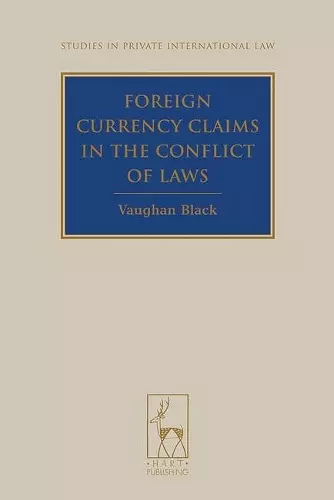Foreign Currency Claims in the Conflict of Laws
Format:Hardback
Publisher:Bloomsbury Publishing PLC
Published:13th Apr '10
Currently unavailable, and unfortunately no date known when it will be back

Problems in assessment of damages remain among the most contentious aspects of private law disputes. The assessment exercise becomes particularly difficult when one of the parties asks that damages be assessed in some foreign currency or claims that, even though damages should be assessed in the currency of the forum, foreign exchange losses should form a head of loss. The 1975 decision of the House of Lords in Miliangos v George Frank (Textiles) Ltd was revolutionary in that it permitted English courts to award judgment in a foreign currency. Miliangos has been influential throughout the common law world and courts in the commonwealth and the United States now contemplate awarding damages in currencies other than their own. However, that modernisation has hardly eliminated the problems in this area. When may a judge assess damages in a currency other than that of the forum? If a court elects to assess damages in its own currency, what conversion date should it select in converting from a foreign currency that was relevant to the obligations between the parties? In an age of fluctuating currencies questions of this nature present judges with choices involving significant financial implications. This book takes a comparative look at how common law courts have addressed damages claims when foreign currencies are involved, and at statutory responses to that issue. It describes the practices of UK, Commonwealth and American courts in this field and draws both on principles of private international law and of damages assessment to analyse current practice.
The book is informative, analytical and comprehensive. The monograph is an outstanding piece, restoring glory to traditional doctrinal scholarship. Drawing on a broad range of issues and factors, the book pulls together a vast amount of sources and ties them into one web covering an extensive ground. It gives a comprehensive and detailed treatment to an area that, in the absence of this book, one would have easily been led to dismiss as narrow, if not insignificant. Lawyers, whether academic, practicing, or law performers, will find the book to be extremely useful. Its thorough analytical research does not leave a stone unturned. The book is well organized and well written ... it is informative, and yet innovative; this is, it contains an excellent description of existing law, presented together with its evolution, and yet is original in its presentation. The analysis is creative and breaks new grounds. It is a welcome addition to Canadian and common law legal literature. Benjamin Geva Canadian Business Law Journal Volume 51 Professor Black... writes in a manner which is not only relatively easy to read but also draws the reader in. Black has managed to take a very complicated area of the law and make it accessible to those not acquainted to it. This title would be appropriate for either those who, like me, had little or no knowledge of the currency of judgment question, or equally for those who have dealt with the issue before and deal with it on a regular basis. Ellie Palmer International Company and Commercial Law Review Volume 22, Issue 5, 2011
ISBN: 9781841138923
Dimensions: 234mm x 156mm x 20mm
Weight: unknown
262 pages